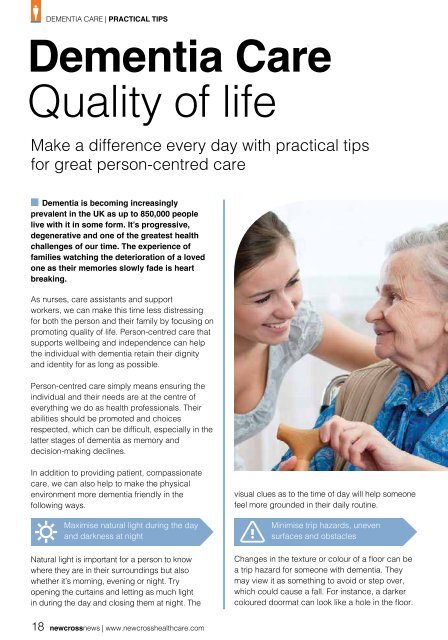NXNews-Issue9-FINAL-ForWeb -160916LowRes
You also want an ePaper? Increase the reach of your titles
YUMPU automatically turns print PDFs into web optimized ePapers that Google loves.
DEMENTIA CARE | PRACTICAL TIPS<br />
Dementia Care<br />
Quality of life<br />
Make a difference every day with practical tips<br />
for great person-centred care<br />
Dementia is becoming increasingly<br />
prevalent in the UK as up to 850,000 people<br />
live with it in some form. It’s progressive,<br />
degenerative and one of the greatest health<br />
challenges of our time. The experience of<br />
families watching the deterioration of a loved<br />
one as their memories slowly fade is heart<br />
breaking.<br />
As nurses, care assistants and support<br />
workers, we can make this time less distressing<br />
for both the person and their family by focusing on<br />
promoting quality of life. Person-centred care that<br />
supports wellbeing and independence can help<br />
the individual with dementia retain their dignity<br />
and identity for as long as possible.<br />
Person-centred care simply means ensuring the<br />
individual and their needs are at the centre of<br />
everything we do as health professionals. Their<br />
abilities should be promoted and choices<br />
respected, which can be difficult, especially in the<br />
latter stages of dementia as memory and<br />
decision-making declines.<br />
In addition to providing patient, compassionate<br />
care, we can also help to make the physical<br />
environment more dementia friendly in the<br />
following ways.<br />
Maximise natural light during the day<br />
and darkness at night<br />
Natural light is important for a person to know<br />
where they are in their surroundings but also<br />
whether it’s morning, evening or night. Try<br />
opening the curtains and letting as much light<br />
in during the day and closing them at night. The<br />
visual clues as to the time of day will help someone<br />
feel more grounded in their daily routine.<br />
Minimise trip hazards, uneven<br />
surfaces and obstacles<br />
Changes in the texture or colour of a floor can be<br />
a trip hazard for someone with dementia. They<br />
may view it as something to avoid or step over,<br />
which could cause a fall. For instance, a darker<br />
coloured doormat can look like a hole in the floor.<br />
18 newcrossnews | www.newcrosshealthcare.com









